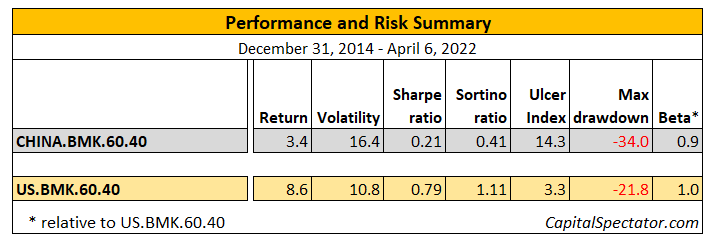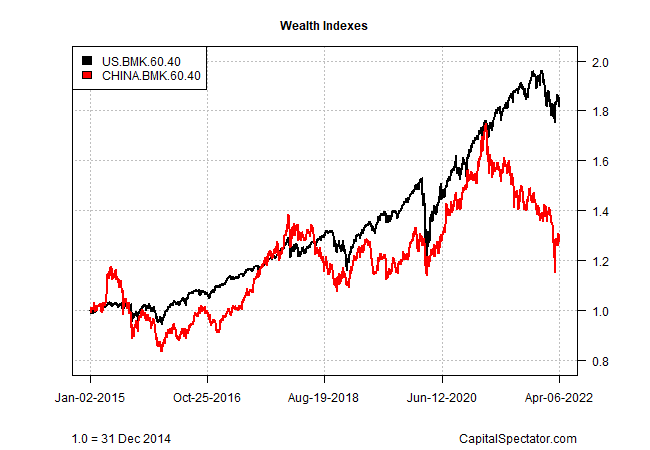In a series of articles, I’ve looked at alternatives to the standard 60/40 stock/bond benchmark using mostly US securities (see links below). This is the fourth article of the series.
Let’s add another flavor to the analysis using a portfolio of China stocks and bonds.
Why China? The reasoning starts with economics. China is the world’s second-largest economy and by some estimates is on track to overtake the US in the near future. The last several decades have shown that investment opportunities in the country have been among the most impressive in the world. On that basis, it’s reasonable to wonder how a China stock/bond portfolio compares.
The challenge from a US investor perspective is that the choices for investing in China are limited and problematic for several reasons. For one thing, China’s markets aren’t fully accessible to foreigners. What is available to US investors has a limited history in terms of publicly traded funds.
As a first approximation of what a China 60/40 portfolio, let’s use a pair of ETFs: iShares MSCI China ETF (NASDAQ:MCHI) and VanEck China Bond ETF (NYSE:CBON).
The US 60/40 mix is built with Vanguard Total Stock Market Index Fund Shares (NYSE:VTI) and Vanguard Total Bond Market Index Fund ETF Shares (NASDAQ:BND). I use a Dec. 31, 2014 start date and rebalance to the respective 60/40 allocations at the end of each calendar year.
The main result: the China portfolio lags the US mix by a substantial degree. The US 60/40 portfolio earned an annualized 8.6% over the sample period, more than twice as much as the China 60/40 benchmark. Looking at the the results after adjusting for risk doesn’t change much.

Part of the challenge with China is that geopolitical risk has increased in recent years as Beijing has taken a more authoritarian turn that favors a political agenda at the expense of economic logic. This shift has been especially conspicuous via markets over the past year or so. Over the trailing one-year horizon, VTI is up 7.4% vs. a 35% loss for MCHI.
There are, of course, many flavors of China ETFs and mutual funds available in the US and so there’s a case for a deeper look into the possibilities for 60/40 benchmarks. Based on our initial review, however, the results don’t look encouraging.
In turn, that suggests that US investors looking to invest in China should favor a relatively tactical, nuanced approach to allocating assets in the country.
In addition, while China’s large economy suggests a relatively hefty weight in a globally diversified portfolio, the political risks associated with the country warrants a lesser allocation vs. what a purely economic profile implies.
Previous articles in this series can be found here:
Exploring Alternatives To The US 60/40 Benchmark: Part I
Exploring Alternatives To The US 60/40 Benchmark: Part II
Exploring Alternatives To The US 60/40 Benchmark: Part III
